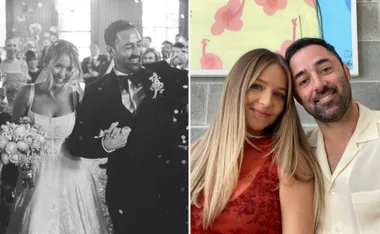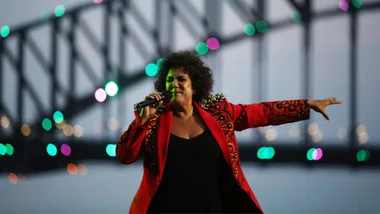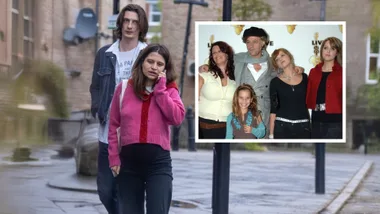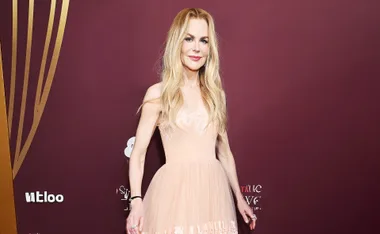It’s bucketing down, but here in central Uganda, a few bone-jarring kilometres down a muddy, rutted dirt road, more than 280 kids have happily donned their uniforms to come to school on a Sunday.
They don’t want to leave on weekdays, either; they hang around after school, playing football or games with stones, until the teachers tell them it’s time to go.
In grindingly poor Katuuso, where most people live on subsistence farms in mud huts without electricity or running water, chores are always waiting at home.
It’s not unusual for five-year-olds to walk 5km every day carrying jerry cans of water on their heads, so the school is a sanctuary – the one place where they can just be kids.
Today, they are working on an enormous artwork for the School for Life Foundation’s fundraising ball in Sydney, the kindy kids dipping their fingers in paint to make handprints, the grade fives painting letters to spell out “thank you”.
Outside, near the giant Musasa tree, an Australian flag flies next to those of Uganda and the Buganda Kingdom, and the foreign anthem plays on sports days, too, acknowledging that Australian donations have built every brick.
Seven years ago, the four-hectare hillside school was just jungle when Annabelle Chauncy and Dave Everett bought the land as 21-year-old uni students.
Since then, they have raised $2.5 million, built the Katuuso Primary and Vocational School and each received a Medal of the Order of Australia.
Annabelle was voted People’s Choice for the prestigious Australian Women’s Weekly and QANTAS Women of The Future competition in 2014.
“We’ve essentially grown something from nothing,” says Annabelle, who manages the foundation’s marketing and fundraising in Australia, but regularly goes back to Katuuso. “It’s certainly not without its challenges, but it’s like my baby.”
When the school opened in January 2011, the kids used to say they wanted to be mothers or fathers, perhaps farmers. In an area with 67 per cent unemployment, where most people have no more than a third-grade education, the children knew of nothing else – and wouldn’t have dared to dream even if they did.
These days, they want to be pilots, police officers, doctors and teachers.
Twelve-year-old Susan Nakabuye, the middle child of nine, plans to become a nurse, whereas once she would have fetched water and washed her family’s clothes – and waited until she married. Her favourite subject is social studies. “We learn about countries and how we can respect people,” she says in English: “I’d like to visit China.”
Two doors down in the tailoring room, a toddler plays on the floor as his mother sews a handbag with one of the school’s 20 solar-powered machines.
The $20,000 cash component of Annabelle’s Women of the Future prize last year was invested in the school’s tailoring program, which has taught
20 local women to sew. Before their training, they earned less than $20 a month, if anything at all.
When 32-year-old Rose Nambooze started the course, she was a single mother living on her father’s land with no means of supporting her seven-year-old child. She now makes as much as $120 a month.
“It gives me a strong feeling because, if there’s any need, I can afford it and I don’t have to panic,” says Rose, through a translator.
“It has changed my life.”
For years, Rose’s father had been blind, but by selling her hand-made aprons, dresses and oven mitts, she could pay for a $200 eye operation and restore his sight. “Before, I could never have afforded that,” she says. “Now he can walk by himself and go where he wants to.”
The impact on each woman’s self-esteem is immeasurable. Many of them would not even look up when the course started; now they chat and make eye contact. They can send their kids to school or buy a cow, pig or chicken to feed their families; one woman is even building houses to rent out.
They speak with pride of turning up to family events with bread and meat, when they used to arrive empty-handed.
“They have a place in society now,” says Angela Mwebaze, the school’s monitoring and evaluation officer.
“They are more respected.”
By their husbands as well. In this patriarchal society, unemployment and alcoholism fuel widespread, culturally accepted domestic violence, but at parent meetings the local men learn another way.
Head teacher Janepher Nansubuga Kintu says that children are “beaten like cows” at Uganda’s public schools, but Katuuso’s approach produces happier, more confident kids.
“We don’t beat, we don’t harass,” says the Montessori-trained teacher. “It’s more loving and encouraging than it is at home.”
The school has actively sought out local children with disabilities and now has five kids with special needs, including one girl with Down syndrome, on the roll. In response, disability is more accepted in the village. “Quite a lot of people have realised it doesn’t mean you’re possessed by the devil,” says Annabelle.
School for Life has put in a bore hole to supply the area with clean drinking water and brings in a free mobile medical clinic, complete with HIV testing, every couple of months, to treat the entire community.
The school has become the beating heart of the village, offering not only education – including English, financial literacy and agricultural training – but also employment.
This month, construction begins on a primary and secondary school 10km away in Bujuuko, which will raise the combined enrolment to an eventual 1400 students.
In a country where less than half the children make it to grade five and a school district where the pupil-to-teacher ratio is 65 to 1, the quality of the teaching at Katuuso is exceptional, with 20 children to each teacher.
Not only that, they receive three meals a day, which transforms their health and nutrition. There is a small school fee to ensure a sense of investment, but if parents are unable to pay they can do odd jobs around the school instead.
At the end of the day, the kids line up for assembly, a choir of weaver birds singing in the nests above them. Giggling and dancing at school on a Sunday, they are a lesson in gratitude and resilience.
“They’re coming from the floor of a mud hut where they slept the night before with seven or eight other kids, and they’re bright-eyed and bushy-tailed, excited to be there,” says Annabelle. “They want to learn, to help themselves out of poverty. They want a better future.”
**WOTF is proudly sponsored by Acer. For more information about Acer click here.






.jpg?resize=380%2C285)




